|
|
|
Sort Order |
|
|
|
Items / Page
|
|
|
|
|
|
|
| Srl | Item |
| 1 |
ID:
119980
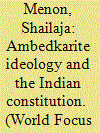

|
|
|
| 2 |
ID:
029694
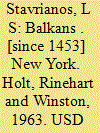

|
|
|
|
|
| Publication |
New York, Holot, Rinehart and Winston, 1963.
|
| Description |
xxi, 970p.Hbk
|
| Series |
Rinehart Books in European History
|
|
|
|
|
|
|
|
|
|
|
|
Copies: C:1/I:0,R:0,Q:0
Circulation
| Accession# | Call# | Current Location | Status | Policy | Location |
| 000523 | 949.6/STA 000523 | Main | On Shelf | General | |
|
|
|
|
| 3 |
ID:
118602
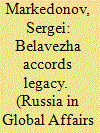

|
|
|
|
|
| Publication |
2012.
|
| Summary/Abstract |
The USSR ceased to exist in December 1991, but the dramatic events of the two subsequent decades have shown that it is premature to view its collapse as a closed chapter of history. The termination of the Soviet Union's existence as a legal fact and the historical process of its disintegration are different things. The country that accounted for one-sixth of the planet's land is gone from the world map, but the disintegration of Soviet statehood persists. Like the breakup of the Western Roman Empire does not boil down to the abdication of Romulus Augustus, or the French Revolution to the storming of the Bastille, or Russia's 1917 October Revolution to the October 25 (in the Julian calendar) coup, the breakup of the USSR is not confined to the December 1991 Belovezha declaration by heads of states of Russia, Ukraine and Belarus on its dissolution. That the process still continues is evidenced by eight armed conflicts, the de-facto emergence of new states (two of which have won international, albeit limited, recognition), unending border disputes, ethnic and religious clashes, and regional conflicts. In 2008 a precedent was created when the borders of former Soviet republics were redrawn. Given unsettled ethno-political conflicts, it is hard to predict when and how these borders will be recognized, and where the self-determination process, launched by Mikhail Gorbachev's perestroika policy, will stop.
|
|
|
|
|
|
|
|
|
|
|
|
|
|
|
|
| 4 |
ID:
163307
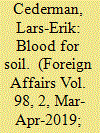

|
|
|
|
|
| Summary/Abstract |
Since the French Revolution, nationalism—the idea that state borders should coincide with national communities—has constituted the core source of political legitimacy around the world. As nationalism spread from western Europe in the early nineteenth century, it became increasingly ethnic in nature. In places where the state and the nation did not match up, such as Germany, Italy, and most of eastern Europe, the nation tended to be defined in terms of ethnicity, which led to violent processes of unification or secession. At the beginning of the twentieth century, ethnic nationalism came to disrupt political borders even more, leading to the breakup of multiethnic empires, including the Habsburg, Ottoman, and Russian ones. By changing the size of Europe’s political units, this undermined the balance of power and contributed to two world wars
|
|
|
|
|
|
|
|
|
|
|
|
|
|
|
|
| 5 |
ID:
100317
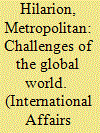

|
|
|
| 6 |
ID:
089203
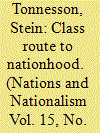

|
|
|
|
|
| Publication |
2009.
|
| Summary/Abstract |
This essay explores the proposition that China and Vietnam represent a fourth class route to modern nationhood, in addition to the ethnic (German), civic (French) and plural (American) routes. Nation-states emerging along the class route are characterised by an exclusive membership based on social class rather than just ethnicity, living under the same laws or participation in liberation from foreign rule. The essay compares China's and Vietnam's class-based nationalism with the more inclusive labour movement nationalisms of Norway and Cyprus. Then it explains how the class route differs from the French civic route. In the conclusion, the author concedes that the Chinese and Vietnamese class route is perhaps a detour rather than a route of its own, since it leads to inevitable tension between the divisive history of how the nation was formed and the need of its later leaders to include and represent the same social classes that were originally excluded. These leaders and their national storytellers are forced to undertake a redefinition of the national self as ethnic, civic and/or plural in an attempt to recreate national legitimacy, often in competition with more radically nationalist opposition groups.
|
|
|
|
|
|
|
|
|
|
|
|
|
|
|
|
| 7 |
ID:
027785
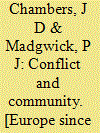

|
|
|
|
|
| Publication |
London, George Philip and Son Ltd, 1968.
|
| Description |
ix, 492p.Hbk
|
| Standard Number |
540000051
|
|
|
|
|
|
|
|
|
|
|
|
Copies: C:1/I:0,R:0,Q:0
Circulation
| Accession# | Call# | Current Location | Status | Policy | Location |
| 000841 | 940.2532/CHA 000841 | Main | On Shelf | General | |
|
|
|
|
| 8 |
ID:
027829
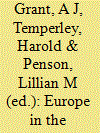

|
|
|
|
|
| Edition |
6th ed.
|
| Publication |
London, Longmans, Greens and Co Ltd, 1969.
|
| Description |
xxii, 603p.: mapsHbk
|
|
|
|
|
|
|
|
|
|
|
|
Copies: C:1/I:0,R:0,Q:0
Circulation
| Accession# | Call# | Current Location | Status | Policy | Location |
| 006194 | 940.27/GRA 006194 | Main | On Shelf | General | |
|
|
|
|
| 9 |
ID:
101879
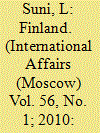

|
|
|
|
|
| Publication |
2010.
|
| Summary/Abstract |
EVERYTHING THAT HAPPENED 200 years ago the war of 1808-1809 and the joining of Finland to Russia were caused by the political and international processes triggered by the French Revolution and Napoleonic Wars.
|
|
|
|
|
|
|
|
|
|
|
|
|
|
|
|
| 10 |
ID:
029491
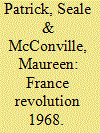

|
|
|
|
|
| Publication |
London, William Heinemann Ltd., 1968.
|
| Description |
238p.Hbk
|
| Standard Number |
434685003
|
|
|
|
|
|
|
|
|
|
|
|
Copies: C:1/I:0,R:0,Q:0
Circulation
| Accession# | Call# | Current Location | Status | Policy | Location |
| 001174 | 940.556/SEA 001174 | Main | On Shelf | General | |
|
|
|
|
| 11 |
ID:
112033
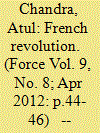

|
|
|
| 12 |
ID:
119879
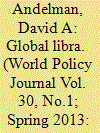

|
|
|
|
|
| Publication |
2013.
|
| Summary/Abstract |
Paris-As a New Year's gift to those who elected him, France's new president, François Hollande, mired in a seemingly intractable economic malaise and about to embark on a war in an old colonial territory of Francophone Africa, made an announcement, which the French daily Le Monde carried as an urgent bulletin. He would put an end to the practice of every ex-president becoming a member of the Conseil Constitutionnel, the final judicial appeal of French citizens. Beginning with himself, though not extending to his hated predecessor, Nicolas Sarkozy, no exiting president would have the inalienable right to a seat on France's highest court. It was a campaign promise, one of 60 that Hollande made, as French presidents are wont to make in the heat of battle but rarely expected to remember, let alone keep. But Hollande has been quite meticulous in honoring a number of them. Still, of the 60 pledges, only two had anything to do with France's hidebound judiciary that has changed little since the Napoleonic Code was established not long after the absolute monarchy was ended by the French Revolution. Even today, in a French court, a defendant who arrives there has already been judged by a juge d'instruction, who is both investigator and judge, and must prove his or her innocence. And while one of Hollande's pledges calls for "suppression of peines-plancher," or unyielding minimum sentences, even this still awaits legislative action.
|
|
|
|
|
|
|
|
|
|
|
|
|
|
|
|
| 13 |
ID:
081163
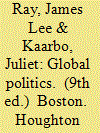

|
|
|
|
|
| Edition |
9th ed.
|
| Publication |
Boston, Houghton Mifflin Company, 2008.
|
| Description |
xix, 578p.Pbk
|
| Standard Number |
9780618783434
|
|
|
|
|
|
|
|
|
|
|
|
Copies: C:1/I:0,R:0,Q:0
Circulation
| Accession# | Call# | Current Location | Status | Policy | Location |
| 053275 | 909.82/RAY 053275 | Main | On Shelf | General | |
|
|
|
|
| 14 |
ID:
111579
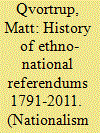

|
|
|
|
|
| Publication |
2012.
|
| Summary/Abstract |
This article presents an overview of the total number of ethno-national referendums since the French Revolution to the present day. After establishing a typology of referendums, the article goes on to present the trends in their use from the beginning of the eighteenth century to the present day. While referendums are said to be about democratic legitimacy and idealistic principles, the history suggest that short- and long-term political calculations have been the main motivations for holding them and that their overall number have grown, especially in times of geopolitical upheaval.
|
|
|
|
|
|
|
|
|
|
|
|
|
|
|
|
| 15 |
ID:
032466
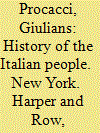

|
|
|
|
|
| Publication |
New York, Harper and Row, Publishers, 1968.
|
| Description |
394p.Hbk
|
|
|
|
|
|
|
|
|
|
|
|
Copies: C:1/I:0,R:0,Q:0
Circulation
| Accession# | Call# | Current Location | Status | Policy | Location |
| 007249 | 945/PRO 007249 | Main | On Shelf | General | |
|
|
|
|
| 16 |
ID:
032473
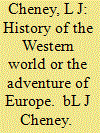

|
|
|
|
|
| Publication |
London, George Allen & Unwin Ltd, 1959.
|
| Description |
335p.Hbk
|
|
|
|
|
|
|
|
|
|
|
|
Copies: C:1/I:0,R:0,Q:0
Circulation
| Accession# | Call# | Current Location | Status | Policy | Location |
| 007909 | 940/CHE 007909 | Main | On Shelf | General | |
|
|
|
|
| 17 |
ID:
133514
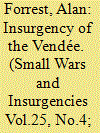

|
|
|
|
|
| Publication |
2014.
|
| Summary/Abstract |
The insurrection in the Vendée combined open warfare with the methods of petite guerre, ambushing French republican soldiers and cutting their supply lines to Paris. These tactics, when combined with the hatreds generated by a civil war, go far to explain to the cruelty of the conflict in the west and the depth of the hatreds it engendered. In republican eyes the use of guerrilla tactics was unjust and illegitimate, and they denounced their adversaries as common criminals and brigands, portraying them as backward, superstitious, even as subhuman, and in the process justified the savage repression they unleashed against them.
|
|
|
|
|
|
|
|
|
|
|
|
|
|
|
|
| 18 |
ID:
133510
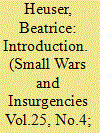

|
|
|
|
|
| Publication |
2014.
|
| Summary/Abstract |
When twentieth-century authors wrote about 'partisan warfare', they usually meant an insurgency or asymmetric military operations conducted against a superior force by small bands of ideologically driven irregular fighters. By contrast, originally (i.e. before the French Revolution) 'partisan' in French, English, and German referred only to the leader of a detachment of special forces (party, partie, Parthey, détachement) which the major European powers used to conduct special operations alongside their regular forces. Such special operations were the classic definition of 'small war' (petite guerre) in the late seventeenth and in the eighteenth centuries. The Spanish word 'la guerrilla', meaning nothing other than 'small war', only acquired an association with rebellion with the Spanish War of Independence against Napoleon. Even after this, however, armies throughout the world have continued to employ special forces. In the late nineteenth century, their operations have still been referred to as prosecuting 'la guerrilla' or 'small war', which existed side by side with, and was often mixed with, 'people's war' or popular uprisings against hated regimes.
|
|
|
|
|
|
|
|
|
|
|
|
|
|
|
|
| 19 |
ID:
065160
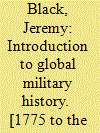

|
|
|
|
|
| Publication |
London, Routledge, 2005.
|
| Description |
xix, 294p.Hbk
|
| Standard Number |
0415353955
|
|
|
|
|
|
|
|
|
|
|
|
Copies: C:1/I:0,R:0,Q:0
Circulation
| Accession# | Call# | Current Location | Status | Policy | Location |
| 050001 | 909.8/BLA 050001 | Main | On Shelf | General | |
|
|
|
|
| 20 |
ID:
095803
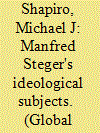

|
|
|
|
|
| Publication |
2010.
|
| Summary/Abstract |
I welcome the opportunity to be inspired and challenged by Manfred Steger's scholarship on ideology at the time of a rising global imaginary. My initial (and appreciative) response in this introduction is drawn from Gilles Deleuze's response to Michel Foucault's masterwork, Discipline and Punish, where he calls Foucault 'a new cartographer'. Drawing on his notion of the diagram, Deleuze suggests that Foucault has altered the topology within which power has traditionally been understood. To understand power, we can no longer 'accept a limited localization'.1 Rather, Foucault maps 'the concrete assemblages of school, workshops, army, etc.' along with 'finalized functions' that carry 'on right up to the state, which strives for global integration, at least in the form of a universalized Market place'.
|
|
|
|
|
|
|
|
|
|
|
|
|
|
|
|
|
|
|
|
|